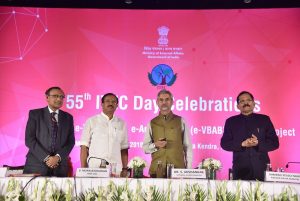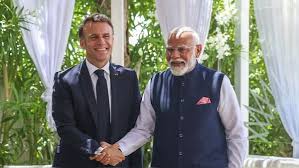
Development cooperation has always played a central role in India’s foreign policy. Ever since our Independence, India has been committed to remain a steadfast and reliable developmental partner by sharing its own vast development experience of over seven decades.The countries of global south are important partners for India. Together we represent the aspirations of 6.3 bn peoples of the world. Many of us have historical ties dating back to centuries, be it through mercantile trade or culture. Our forefathers have struggled together against colonial bondages. Today our collective bilateral trade stands around US$220 billion.
Given these historical and economic bearings, India’s development co-operation and our support to the cause of multilateralism flow from the philosophy of inter-connectedness and interdependence from our philosophy of Vasudhaiv Kutumbakam. India’s relations with partner countries are based on the principles of equality, mutual respect for sovereignty and freedom of action and choice. It is not based on competition, conditionalities or prescriptions. It stems from the spirit of solidarity to enhance mutual learning for shared and sustainable growth.
These are also the cornerstones in our capacity building initiatives which span from Latin American countries to Pacific Island countries, as we traverse similar paths of development.Today, governance is confronted with new complexities- multilateral structures of international governance are under threat of disruptive trends necessitating stabilising partnerships among developing countries. Even the nature of economic growth is changing in the emerging markets. Infrastructure and natural resources led growth is to be matched with technology and knowledge driven growth.
Though developing countries are blessed with bounties of Nature and enjoy demographic dividend, however, we are faced with similar and daunting challenges- population resource imbalances, rising inequities along with rising aspirations of the youth, climate change, technologies that change all too quickly, almost ruthlessly-that we have to keep pace with-are all common denominators for overcoming barriers to independent policy making and balanced economic growth.
In the wake of these challenges, we need to expand our partnership choices in foreign cooperation and resolve to collaborate more closely to press ahead with our SDGs. Thus, in its own modest way, India has also tried to step-up the material resources and enabling mechanisms, especially in the past one decade in sharing of our development experience with the rest of the world.
Setting up of the Development Partnership Administration Division as a dedicated agency within MEA, enhancement of budget allocations for partner countries, increase in the size of the Foreign Service, including hiring of subject matter experts, increasing number of scholarships etc. are some of the recent measures taken by the Ministry in this regard.
Moreover, in all the recent development co-operation initiatives, capacity building has been a central theme. Several announcements for enhancement of ITEC training slots have been made during the recent bilateral visits and also at the various multilateral engagements such as the Bay of Bengal Initiative for Multi-Sectoral Technical and Economic Cooperation (BIMSTEC), Association of South East Asian Nations (ASEAN), IAFS-III, Caribbean Community (CARICOM), FIPIC- to name a few.
These capacity building efforts are also in line with India’s regional priorities with ‘Neighbourhood countries being First’ and Africa being central in the scheme of things – givenour PM’s focus on Africa and our commitment to support the Africa 2063 Agenda. This is of course not to undermine our efforts of co-operation with our other regional partners which are equally valuable and unique.
Ladies and Gentlemen, it would be an understatement if I say that access to affordable and quality healthcare, professional skills and higher education are vital factors in helping people maximise their growth potential. India is also acutely aware of their role as determinants of human development.
As you may be well aware, our Hon’ble PM also envisions India’s collective and inclusive development through his emphatic call for ‘Sabka Saath Sabka Vikaas Sabka Vishwas’ (Co-operation of all for development of all) and also through flagship schemes like ‘Pradhan Mantri Kaushal Vikaas Yojna’ (Skill India Mission) which highlight the role that skills play in nation building.
And to make the benefits of these development schemes accessible to the last person in the remotest of region, Hon’ble PM has pushed for digitisation of the delivery of flagship schemes. For e.g, our e-education programmes provide quality education and are oriented towards shrinking the technological skill gap.
Thus today, India is an example of e-governance, bringing greater transparency, efficacy and accountability in the system and firmly believes that we should take maximum advantage of digital technology to reap its benefits for self-reliance and meeting our SDG priorities.
Based on these learnings and technological advancements within India in the last 5 years, ITEC and eVBAB have thus been upgraded from their previous avatars with an aim to provide demand-driven support to our partner countries in filling gaps in human resource development and the delivery of affordable and quality health services. Therefore, today these two initiatives truly reflect India’s firm resolve in sharing our own development experiences and best practices with the Global South.
Apart from this, India seeks to be leader in Climate Change Action. India’s initiative of the International Solar Alliance led by the vision of our Hon’ble PM is testimony to the fact that we are committed to a clean and sustainable future for the children of tomorrow.
We are fast moving towards use of clean technologies and e-vehicles for reduction of fossil fuel dependency and emissions. We have also the fastest growing solar energy programme in the world. The target of production of 175 GW of renewable energy that India set for itself as part of the Solar Alliance Initiative and its integration in the main power grid, is well on its way to be achieved.
The significance of these achievements lies in the fact that India does not limit its efforts towards climate change action to its soil. Much of our development assistance, particularly capacity building through ITECis geared around training and projects in solar technologies and other renewables in Africa, Caribbean and Pacific island countries.
India believes in a shared future. Sharing of capacities leads to formation of professional and economic inter-linkages which in turn generate the ecosystem for co-creation of mutually beneficial policies and technologies. An economically and technologically connected world helps building bridges of friendship and camaraderie for lasting peace and prosperity.
Let me once again convey my best wishes to everyone for a renewed vigour that has been put behind our capacity building initiatives through today’s successful launch of new initiatives under ITEC and also the launch of eVBAB. I am thankful to all the guests for sparing the time to join us this afternoon and thus reaffirming their commitment towards these initiatives. I take these last few words to thank all of you – GOI ministries, ITEC institutions and resident diplomatic missions, who I am sure will continue working closely to take these initiatives to greater heights and make them truly worthwhile for all of us.
Address by External Affairs Minister on Celebration of 55 years of ITEC
Author Profile
- India Writes Network (www.indiawrites.org) is an emerging think tank and a media-publishing company focused on international affairs & the India Story. Centre for Global India Insights is the research arm of India Writes Network. To subscribe to India and the World, write to editor@indiawrites.org. A venture of TGII Media Private Limited, a leading media, publishing and consultancy company, IWN has carved a niche for balanced and exhaustive reporting and analysis of international affairs. Eminent personalities, politicians, diplomats, authors, strategy gurus and news-makers have contributed to India Writes Network, as also “India and the World,” a magazine focused on global affairs.
Latest entries
 DiplomacyJanuary 5, 2026India walks diplomatic tightrope over US operation in Venezuela
DiplomacyJanuary 5, 2026India walks diplomatic tightrope over US operation in Venezuela India and the WorldNovember 26, 2025G20@20: Africa’s Moment – The Once and Future World Order
India and the WorldNovember 26, 2025G20@20: Africa’s Moment – The Once and Future World Order DiplomacyOctober 4, 2025UNGA Resolution 2758 Must Not Be Distorted, One-China Principle Brooks No Challenge
DiplomacyOctober 4, 2025UNGA Resolution 2758 Must Not Be Distorted, One-China Principle Brooks No Challenge India and the WorldJuly 26, 2025MPs, diplomats laud Operation Sindoor, call for national unity to combat Pakistan-sponsored terror
India and the WorldJuly 26, 2025MPs, diplomats laud Operation Sindoor, call for national unity to combat Pakistan-sponsored terror







